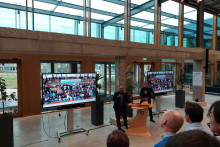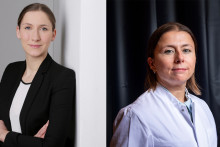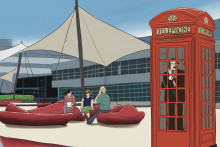Subramaniam: ‘Absolutely. Although I prefer the term “mixed classroom”. There is no need to counterpose national to international; that’s just one dimension of diversity. Even if a group appears to be homogeneous, there can still be diversity. What about first-generation students, or a student from Amsterdam working with a student from a village? When you leave university and start working at a company or government agency, you also join a mixed team. You can’t pick and choose your colleagues.’
De Vries: ‘Exactly. Once you graduate, you encounter people from all kinds of different cultures, backgrounds and areas of expertise in your professional life. The fact that we as a university can offer this type of situation in a controlled learning environment can only be positive.’
Roos: ‘The international classroom can only be a true enrichment if students feel comfortable. Unfortunately, many international students are worried about accommodation, or experience high academic pressure because of the conditions attached to certain scholarships. This leads to stress and other well-being issues. The same applies to lecturers. An international classroom is not an enrichment if the increase in the number of students comes at the expense of lecturers’ well-being. Of course, international students are not to blame for this. Ultimately, it’s up to universities to find the right balance.’
Otto: ‘Of course there are challenges. Group work requires clear communication, and the mix of different cultures sometimes complicates that. I know of plenty of cases where things went wrong, for example when students have insufficient command of English. But there are two sides to every coin. UT students are well prepared to work in an international environment, where you also encounter different cultures.’
Subramaniam: ‘We should teach students more than just the subject matter. As far as I’m concerned, we start assigning students to working groups randomly in order to more effectively push students into meeting and collaborating with new people in unexpected ways.’
Otto: ‘That could be enriching, especially here in Twente, because there is a lot of group work. Learning about different cultures broadens your horizons, not just in the educational field but also beyond. And I think it’s not so much about the language per se. After all, you can have an international environment where Dutch is used as the working language. And vice versa: an exclusively English-speaking environment can be non-international in nature.’
‘Students should be able to choose where they want to study, especially in Europe’
De Vries: ‘As a university, we’ve now reached the point where being international has become the norm. A strong follow-up to this would be to have the programmes take on an even more active role in deciding upon the balance and composition of their own student population and profile themselves accordingly; to determine from this local perspective what kind of student you want to educate for the Netherlands, Europe or the world.’
Who's who?
These were the participants in the discussion:
- Vinod Subramaniam, UT’s President of the Executive Board
- Fridtjof Otto, international ATLAS student and member of University Council party UReka
- Pieter Roos, associate professor in the Civil Engineering programme
- Fred de Vries, Head of Internationalisation Strategy at the Strategy & Policy Department
Otto: ‘They probably factor into it, but I don’t believe the financial considerations are the main concern. It also doesn’t help that international students are portrayed as “cash cows”. The university’s vision is to offer students an international environment.’
De Vries: ‘The Netherlands is a proud member of the European Union and ever since the Bologna Declaration was introduced, it only makes sense that we open up our education to students from abroad. I’d recommend not getting bogged down in the financial details. Instead, we should take a more holistic approach: students come here to develop themselves. We have a responsibility to help them do so, regardless of whether they want to stay here after completing their studies or not.’
Otto: ‘It’s also about academic freedom. Students should be able to choose where they want to study, especially in Europe. Promoting mobility in higher education is the starting point of the Bologna Declaration. Europe presents a wonderful playing field for students, the last thing we want to do is limit it.’
Subramaniam: ‘What’s more important than the financial aspect is the question of which student population is needed. That’s also what the political discussion is about: what is a healthy balance? Maastricht, Groningen but also Twente are border regions, unlike a university in Amsterdam for example. That’s why it’s important not to lump all universities together. I understand the arguments of parties that are concerned about accessibility of education to Dutch students. And we should guarantee this accessibility. ‘However, the perception that Dutch students are being crowded out by internationals is incorrect.’
De Vries: ‘Dutch students have been competing for student intake for quite some time. As a relatively small university, this affects us more than others - we needed to go along with the organisation of mixed student groups in order to remain viable. But I don’t think internationalisation as a movement is what’s an issue. It’s rather some of the unwanted consequences, for example in terms of accommodation.’
Roos: ‘I’m not really qualified to form a judgement on this, but it does seem that maintaining the market share is an important factor. Still, I think it’s also rooted in genuine ideas about internationalisation. We want to be a university with an international character.’

Roos: ‘I think so. On average, international students face more difficulties than Dutch students, although the latter group is also affected by the tight housing market. I believe the UT should devote more attention to this issue. As they say: in for a penny, in for a pound. We opened our doors to international students, so now we should support them as best we can. It’s not like we have to pamper them, but the UT does have a big responsibility.’
‘Student well-being starts with feeling welcome on campus’
Subramaniam: ‘What doesn’t help is that we’re not allowed to build student housing ourselves under current legislation. That’s why we’re trying to address the problem through partnerships with the municipality and the regional business community. There is room to experiment within our community - both in terms of accommodation and student well-being. Fail fast, fail often. If something doesn’t work, we should move away from it. But above all, we should keep trying out new options.’
Otto: ‘Student well-being starts with feeling welcome on campus. If international students can fall back on a social network, they’re less prone to depression, stress and anxiety. This starts at the Kick-In, the introduction week where students make their first social contacts. Study associations also play an important role. The threshold for students to seek help for mental problems should be low. A contact point within a study association constitutes a much lower threshold than an official agency.’
De Vries: ‘This shouldn’t be problematised, it should be organised. That requires flexibility from lecturers and more support from student advisers or, for example, from within our information services. I think we feel that responsibility as a university and there are definitely more steps we can take in this respect. That also applies off-campus, for example, in how the region opens itself up to international students.’
Subramaniam: ‘How great would it be if we could offer accommodation to every student who enrols in a programme? To that end, we need to look beyond just the city of Enschede. Almelo is less than twenty minutes away by train. Students bring cities to life, I’ve seen it in Enschede. It’s a totally different city than it was ten years ago. The city is flourishing, and it’s thanks to the students.’

De Vries: ‘I think of it as a two-way street. Twente has many SMEs and I understand that it can be difficult as a relatively small company to “adopt” an international graduate. What would definitely help is if companies gave more thought to creating an attractive environment for international UT students. There are plenty of engineers who thrive in a smaller, international bubble. But it also works the other way around, especially with regard to the language. You should be able to get by perfectly well in English professionally, but the same can’t be said for informal situations, like coffee breaks. Learning the language helps you feel at home. If you come here to study, it makes perfect sense that English is the lingua franca at university. But if you want to stay here, you’d do well to master the Dutch language.’
‘We have an important role in the region as a standard-bearer’
Otto: ‘A good way to keep students in the region is to introduce them to the Dutch language and culture. One way we do this is through the minor ‘Going Dutch’, initiated by UReka. It’s also important that internationals become familiar with regional companies during their studies, for example by attending the Business Days or visiting Kennispark. The point is for international students to start envisioning a future for themselves here in Twente.’
Roos: ‘We shouldn’t distinguish between international and Dutch students. Let’s avoid labels and think of them as one whole. I think it’s important for both groups to come into contact with the regional business community.’
Subramaniam: ‘We have an important role in the region as a standard-bearer. A regional university plays a defining role in the local ecosystem, which is not the case in a city like Amsterdam, as I know from experience. Of course, there is room for improvement when it comes to students’ stay rate. So I say to the business community: put in the work, provide attractive jobs! However, as a university, we don’t just educate students for the region, but also for the country and the rest of the world. Our students remain as popular as ever due to their entrepreneurial mindset. Recently, I heard people at ASML say that UT students are very welcome guests. Not only are they well-educated, they’ve also learned to work together, in diverse teams.’







